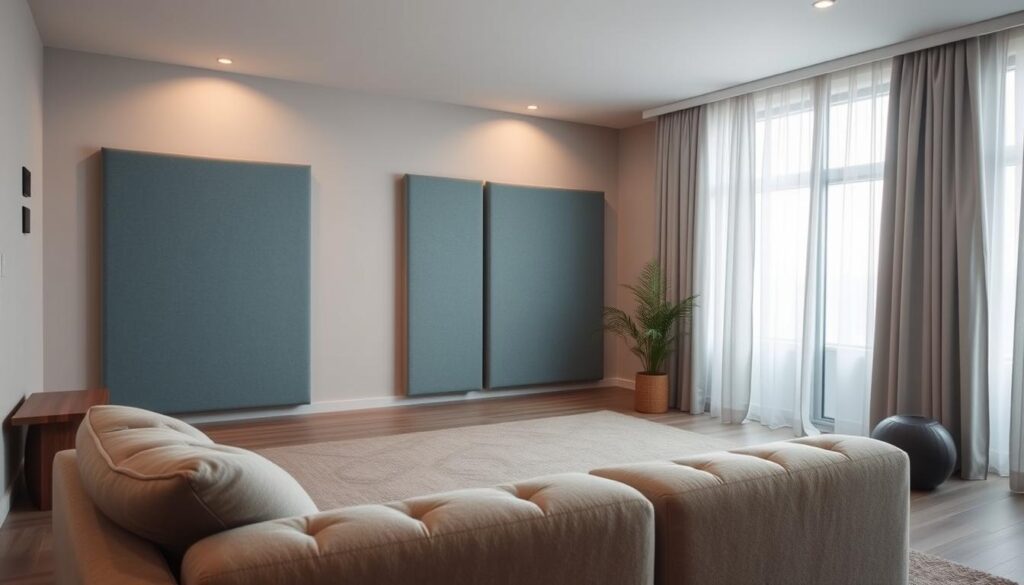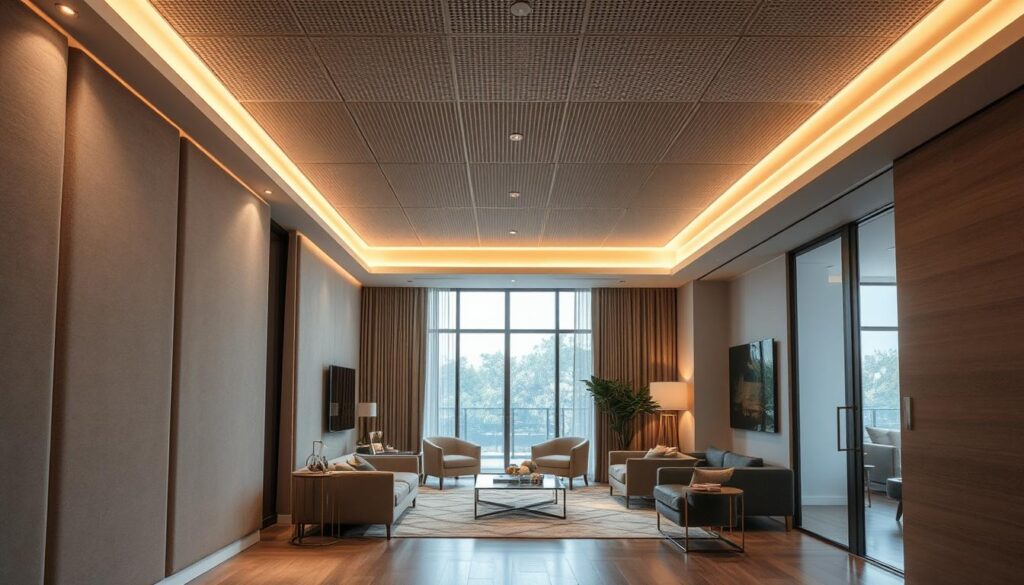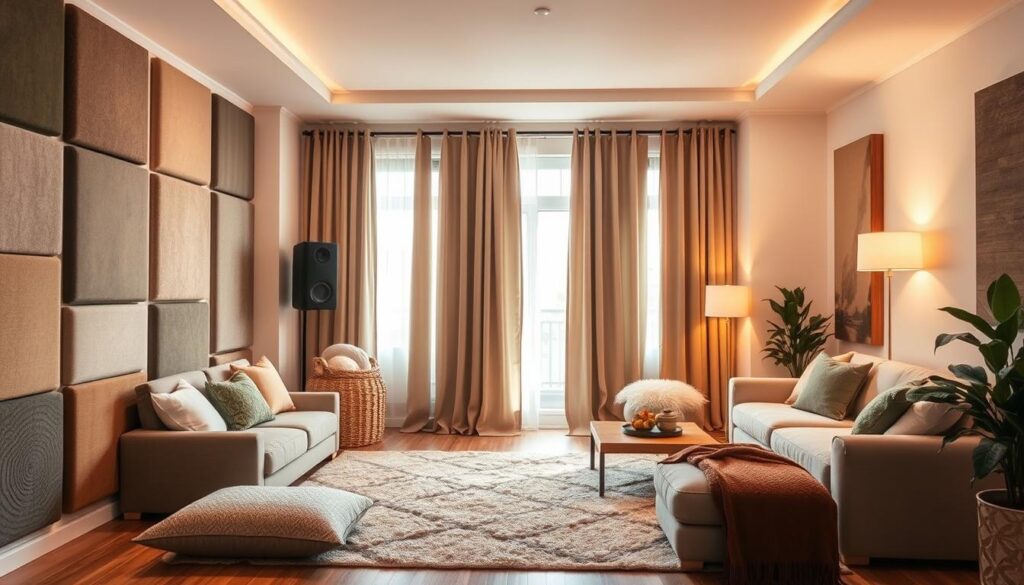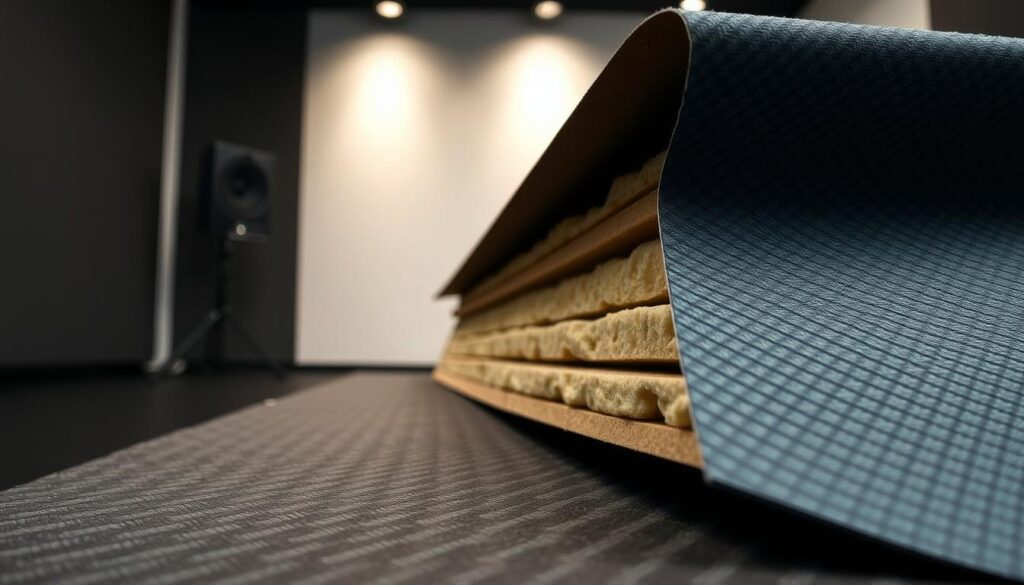Imagine having a personal sanctuary where you can unwind and recharge. A zen space is more than just a quiet room. It’s an environment that fosters mental well-being and relaxation. By minimizing noise pollution, you can create a haven that promotes mindfulness and calmness.
Noise disturbance can significantly impact your mental health, making it challenging to relax and focus. Soundproofing your personal space can help mitigate this issue. It allows you to enjoy a peaceful environment that supports your overall well-being. The benefits of soundproofing extend beyond just reducing noise; they contribute to a serene atmosphere that nurtures your mental health.
By incorporating soundproofing into your zen space, you can reap the rewards of a quieter, more calming environment. This, in turn, can lead to improved mental health and a greater sense of relaxation.
Understanding the Importance of Soundproofing
In today’s fast-paced world, soundproofing is key to fighting noise pollution’s harm to your mental health. It’s crucial to create a peaceful space in modern life. Soundproofing helps a lot, offering more than just quiet.
Defining Soundproofing and Its Benefits
Soundproofing means making sound travel less from one place to another. It uses materials and methods to stop or absorb sound. This improves your mental health and life quality. You’ll see better focus, less stress, and better sleep.
Soundproofing can fit your needs, whether for work, music, or sleep. Knowing how it works lets you make a calm space for your mind.
| Soundproofing Benefits | Description | Impact on Mental Health |
|---|---|---|
| Improved Focus | Reduces distractions, enhancing concentration | Boosts productivity and reduces stress |
| Stress Reduction | Minimizes noise-induced stress | Promotes relaxation and calmness |
| Better Sleep | Creates a quiet environment conducive to sleep | Enhances sleep quality and duration |
The Relationship Between Sound and Mental Health
The link between sound and mental health is deep and complex. Noise pollution can lead to more stress, anxiety, and depression. Knowing this helps you fight noise’s negative effects on your mind.
Soundproofing is a big help in this fight. It creates a quiet space that protects your mental well-being. This leads to more relaxation, less stress, and better mental health overall.
The Impact of Noise Pollution on Your Well-being
Noise pollution quietly harms your mental health and relaxation. It’s a big problem that affects millions globally, leading to physical and mental health issues.
Common Sources of Noise Pollution
Noise pollution comes from many places, like traffic, construction, and loud music. These sounds are really annoying in cities, where the noise never stops.
- Traffic noise from highways and busy streets
- Construction and demolition activities
- Loud music from concerts, bars, or personal entertainment systems
- Air traffic and airports
Short-term and Long-term Effects of Noise
Noise pollution has both quick and lasting effects on your health. Short-term, it can make you stressed, anxious, and tired. Long-term, it can cause serious problems like heart disease, hearing loss, and mental health issues.
Knowing these risks is key to protecting yourself. By understanding where noise comes from and how it affects us, we can start to find ways to make our spaces quieter. This could mean using soundproofing to make our homes and work areas more peaceful.
Soundproofing can greatly reduce the effects of noise pollution. It helps improve your mental health and overall well-being. The benefits of soundproofing are clear: it helps you relax, focus, and live a better life.
How Soundproofing Enhances Focus and Productivity
Soundproofing helps you focus better by cutting down on distractions. In today’s world, it’s key to have a place where you can concentrate well. Soundproofing keeps outside noises from getting in the way of your work or creativity.
Creating a Distraction-Free Environment
A place without distractions is crucial for staying focused. Soundproofing makes this possible by blocking out outside sounds. This is very important in home offices and studios, where noise can be a big problem. By soundproofing, you make a space that helps you concentrate and be more productive.
Here are some ways to make a distraction-free area:
- Use soundproofing materials like acoustic panels and blankets
- Seal gaps and cracks around doors and windows
- Install soundproofing windows or doors
For more on how soundproofing boosts productivity, check out KubeBooth’s blog on soundproof pods. It talks about how soundproofing helps with employee mental health and well-being.
Soundproofing in Home Offices and Studios
Home offices and studios need a quiet space to do great work. Soundproofing these areas helps you focus better. Here are some benefits of soundproofing in these spaces:
| Benefits | Description | Impact on Productivity |
|---|---|---|
| Reduced Distractions | Minimizes external noise | High |
| Improved Focus | Enhances concentration | High |
| Better Work Quality | Results in higher quality work | High |
Soundproofing your home office or studio makes your work space better. It helps you work more efficiently and improves your overall well-being. This is because it reduces stress from noise distractions.
The Role of Soundproofing in Stress Reduction
Understanding how noise affects stress is key to a quieter home. Noise pollution is a big problem worldwide, causing health issues. It greatly impacts mental health, raising stress levels.
Noise and Stress: The Connection Explained
Noise and stress are closely tied. Loud or constant noise triggers stress hormones like cortisol and adrenaline. These hormones get your body ready to react, raising heart rate and blood pressure.
While this response is meant to be short-lived, long-term noise can cause lasting stress. This stress can harm your mental and physical health.
Chronic stress can lead to health problems like anxiety and heart disease. Lowering noise through soundproofing can reduce stress and improve your health.
Techniques for Reducing Noise-Induced Stress
There are ways to lower stress from noise through soundproofing. Using soundproofing materials like acoustic panels can help. These materials block noise, making rooms quieter.
- Seal gaps and cracks around doors and windows to prevent noise leakage.
- Use soundproofing curtains or drapes to reduce external noise.
- Install soundproofing panels in home offices or studios to create a distraction-free environment.
By using these soundproofing methods, you can make your space quieter. This can lower your stress and improve your mental health.
Creating a Tranquil Home Environment with Soundproofing
Making your home a peaceful place is simpler than you might think. The right soundproofing can greatly improve your life. It’s all about understanding how soundproofing boosts mental health and using the best strategies.
Soundproofing is more than solving noise problems. It’s about making a space that encourages calm and mental health. The impact of soundproofing on mental health is huge. It helps you relax, focus, and enjoy your home more.
Choosing the Right Soundproofing Materials
Picking the right soundproofing materials is key to quieting your home. Various materials absorb and block sound differently. For example, acoustic panels can cut down echo and absorb sound in a room. Mass-loaded vinyl helps block sound through walls and ceilings.
- Acoustic panels for sound absorption
- Mass-loaded vinyl for blocking sound transmission
- Soundproofing blankets for added insulation
For more info on soundproofing walls, check out Soundproof Spaces. They show how to turn loud areas into peaceful spots.
Tips for Soundproofing Different Spaces
Every part of your home might need its own soundproofing plan. Home offices and studios need materials that soak up sound and cut down echo. This boosts focus and productivity. Bedrooms, though, need materials that keep out outside noise for better sleep.
Think about what each room needs when picking soundproofing materials and methods. This way, you can create a soundproofing plan that fits your life perfectly.
Soundproofing for Better Sleep Quality
Creating a quiet sleep environment is key for restful nights and mental wellness. Noise can disrupt sleep patterns, leading to mental health issues. Understanding how noise affects sleep and using soundproofing solutions can improve your sleep quality.
How Noise Disrupts Your Sleep Patterns
Noise can make it hard to fall asleep and stay asleep. Studies show that noise during sleep increases stress and anxiety. Noise disturbance can make you wake up often, reducing sleep quality.
Common noise sources include traffic, neighbors, and household members. Even low levels of noise can be disturbing, more so for light sleepers. It’s crucial to identify and reduce these noise sources.
Soundproofing Solutions for Bedrooms
Soundproofing your bedroom can greatly improve sleep quality. Here are some effective solutions:
- Adding mass to walls and ceilings with materials like mass-loaded vinyl
- Sealing gaps and cracks around doors and windows
- Using soundproofing curtains or drapes
- Installing soundproofing panels or acoustic treatment
For more information on soundproofing and its mental health benefits, visit this resource.
| Soundproofing Solution | Effectiveness | Cost |
|---|---|---|
| Mass-loaded Vinyl | High | Moderate |
| Soundproofing Curtains | Moderate | Low |
| Acoustic Panels | High | High |
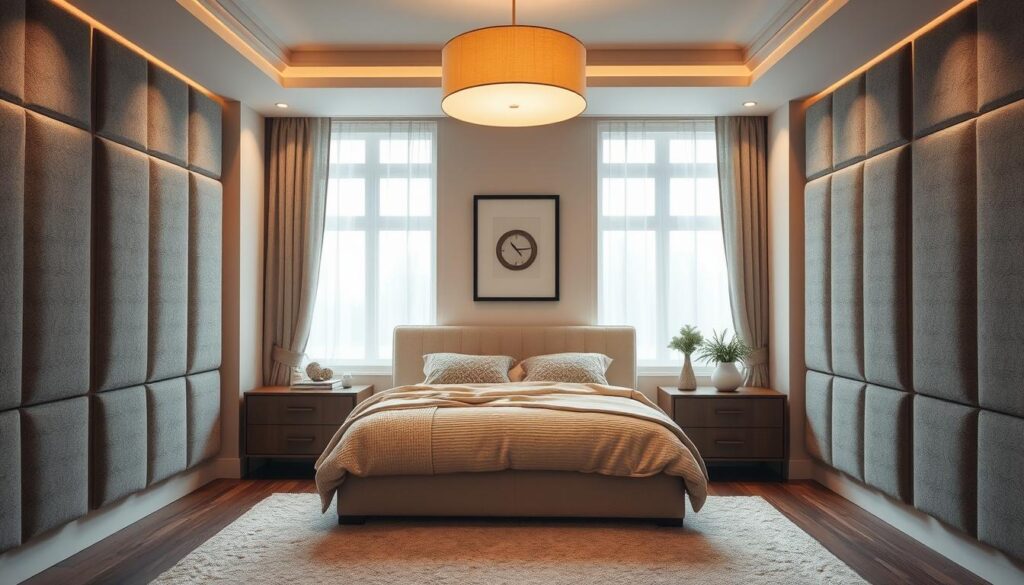
By using these soundproofing solutions, you can make your sleep environment quieter. This leads to better sleep quality and mental well-being. A well-rested mind can better handle daily challenges, making soundproofing a valuable investment for your mental health.
The Psychological Benefits of a Quiet Space
Having a quiet space is great for your mind. Soundproofing helps make such a space. It reduces distractions, improving your mental health.
A quiet area brings calm and clear thinking. This is hard to find in loud places. It lowers stress and anxiety.
Calmness and Clarity in a Soundproofed Environment
In a quiet space, you get many benefits, including:
- Improved focus: You can focus better without background noise.
- Enhanced creativity: Peaceful places inspire new ideas.
- Better mental clarity: Less noise means clearer thoughts and decisions.
Boosting Mental Health Through Reduced Noise
Soundproofing reduces noise, which is good for your mind. Some benefits are:
- Reduced stress levels: Less noise means less stress and anxiety.
- Improved mood: Quiet places make you feel better and more relaxed.
- Enhanced self-care: A peaceful space helps you take care of yourself.
Investing in soundproofing creates a peaceful place. It’s key for mental health and well-being. It helps you live a healthier, more balanced life.
Incorporating Soundproofing into Your Lifestyle
Adding soundproofing to your life can greatly improve your well-being. It helps create a quieter space, perfect for relaxation. In today’s noisy world, this is more important than ever.
Soundproofing can also boost your mental health. It reduces stress and distractions, helping you focus better. Plus, a quieter home means better sleep, which is key for health.
Soundproofing Solutions for Renters
For renters, soundproofing might seem hard because of property rules. But, there are easy fixes. You can use acoustic panels, area rugs to soak up sound, and weatherstripping to block noise.
Portable soundproofing booths or personal soundproofing pods are great for renters too. They make quiet spots in loud places. Also, soundproofing curtains or thick drapes can block outside noise.
| Soundproofing Solution | Benefits | Cost |
|---|---|---|
| Acoustic Panels | Reduces echo and absorbs sound | $50-$100 |
| Area Rugs | Absorbs footstep noise and reduces echo | $20-$50 |
| Weatherstripping | Seals gaps under doors to reduce noise leakage | $5-$10 |
Long-term Benefits of Investing in Soundproofing
Soundproofing brings many long-term benefits. It boosts your mental health and home value. A soundproofed home attracts buyers, which can increase its worth.
It also saves money in the long run. You won’t need earplugs or white noise machines. A quieter home can also lower health costs by reducing stress.
By adding soundproofing to your life, you get a quieter, more peaceful home. Whether renting or owning, there are many solutions. Soundproofing improves your mental health, productivity, and overall quality of life.
Conclusion: A Quiet Space for a Peaceful Mind
Creating a zen space in your home is key for mental well-being and relaxation. Soundproofing is vital in making this space. It keeps you away from outside noise.
Soundproofing solutions can greatly improve your mental health. They help reduce stress, improve focus, and enhance sleep quality. These benefits show how important soundproofing is for mental wellness.
Remember, soundproofing is an investment in your mental health. By making your home quieter, you’ll enjoy many benefits. Start today and see how soundproofing can improve your well-being.
